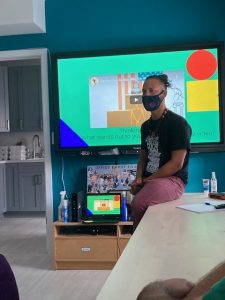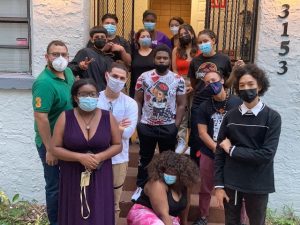I’m writing to you from the stolen land of the Seminole, Tequesta, & Miccosukee also known as Miami. As we get closer to “Thanksgiving” we must ask ourselves, what are we celebrating?
“For many Native Americans[…]Thanksgiving is a national day of mourning over the genocide that took place throughout America” (3 Ways to Decolonize Thanksgiving).
In reality, the event of Thanksgiving did happen in 1621 between the Wampanoag and Bradford’s people from the Mayflower. They feasted together, but it’s important to realize that the concept and narrative we are given doesn’t tell the full story.
“Stereotypical and racist portrayals of Native peoples fill U.S. elementary schools each November as students encounter historically-inaccurate portrayals of Native peoples in arts & crafts, books and lessons[…] By taking a decolonizing approach to teaching about Thanksgiving, teachers, and families reject the myths of Thanksgiving and harmful stereotypes about Native peoples” (Decolonizing Thanksgiving: A Toolkit for Combatting Racism in Schools).
Thanksgiving was and is an Indigenous celebration of the seasonal harvest, not the Euro-centric celebration often depicted in history books. These seasonal celebrations are common and can still be seen in farming communities, like Zaka Fest or the Maricao Coffee Harvest Festival in the Caribbean. Thanksgiving is a time of celebration and community that happens at the end of harvest and should no longer be reduced to a Eurocentric-focused holiday once a year.
So, why aren’t our schools, communities, and families teaching our youth about our Indigenous people and decolonizing the education around Thanksgiving? The truth is in the US a lot of decision-makers, mostly White men, don’t come from our communities and see nothing wrong with the false narrative. Our education system caters to a Eurocentric narrative as if Americans are all of European descent.
“Thanksgiving, like Columbus Day, serves as a reminder of the genocide, [slavery], and violence Native communities experienced and continue to experience” (9 Ways to Decolonize and Honor Native Peoples on Thanksgiving).
This blog is meant to offer insight, mostly from an Indigenous perspective, on how we can and should view this holiday. Educating ourselves is so valuable and allows us to heal together instead of ignoring the past. We can’t heal from something we don’t acknowledge. Stereotypes, such as images or mascots of indigenous people, that children normalize growing up are harmful and offensive. By having spaces to dialogue about the true meaning behind Thanksgiving we can move away from enforcing ahistorical myths and move towards the original celebratory purpose of enjoying the harvest. Another suggestion could be to create restorative justice circles at school to discuss the harm and trauma experienced by indigenous communities. These are just some suggestions on ways to move forward and hold us accountable for telling the truth.
Alexis Buten offers 3 ways we can decolonize Thanksgiving:
- Combat erasure [and center Indigenous cultures] by telling the real story of Thanksgiving around the table. Here’s an article to get you started.
- Re-center Thanksgiving by serving locally sourced food. Your local farmers market is a great place to find locally grown foods.
- Address oppression by widening your circle. Ask someone outside your usual group of friends and family what Thanksgiving means to them. [Try educating your friends and family on the historical story versus the Eurocentric myth] (3 Ways to Decolonize Thanksgiving).
We should teach our youth and ourselves about Thanksgiving and as we understand history better, we can both respect our Native American people’s mourning and share what we give thanks for as we gather with friends and family, whether chosen or biological.
Educating ourselves is how we can honor, respect, and decolonize Thanksgiving. We can only expect to move forward as a society if we acknowledge and know our past, not ignore it or spread myths. When we know better we must do better. I am thankful for opportunities to create dialogue (at times uncomfortable) and celebrate the holiday as it was intended to be. Indigenous people are land and water protectors that have a beautiful relationship with the land. I encourage you to continue to learn and educate yourself. Now that you have a better understanding, let’s move away from the lies we were told and be grateful for those who took the time to harvest the food we eat and those who cook. Let’s mourn the genocide of Indigenous people and acknowledge their existence.



